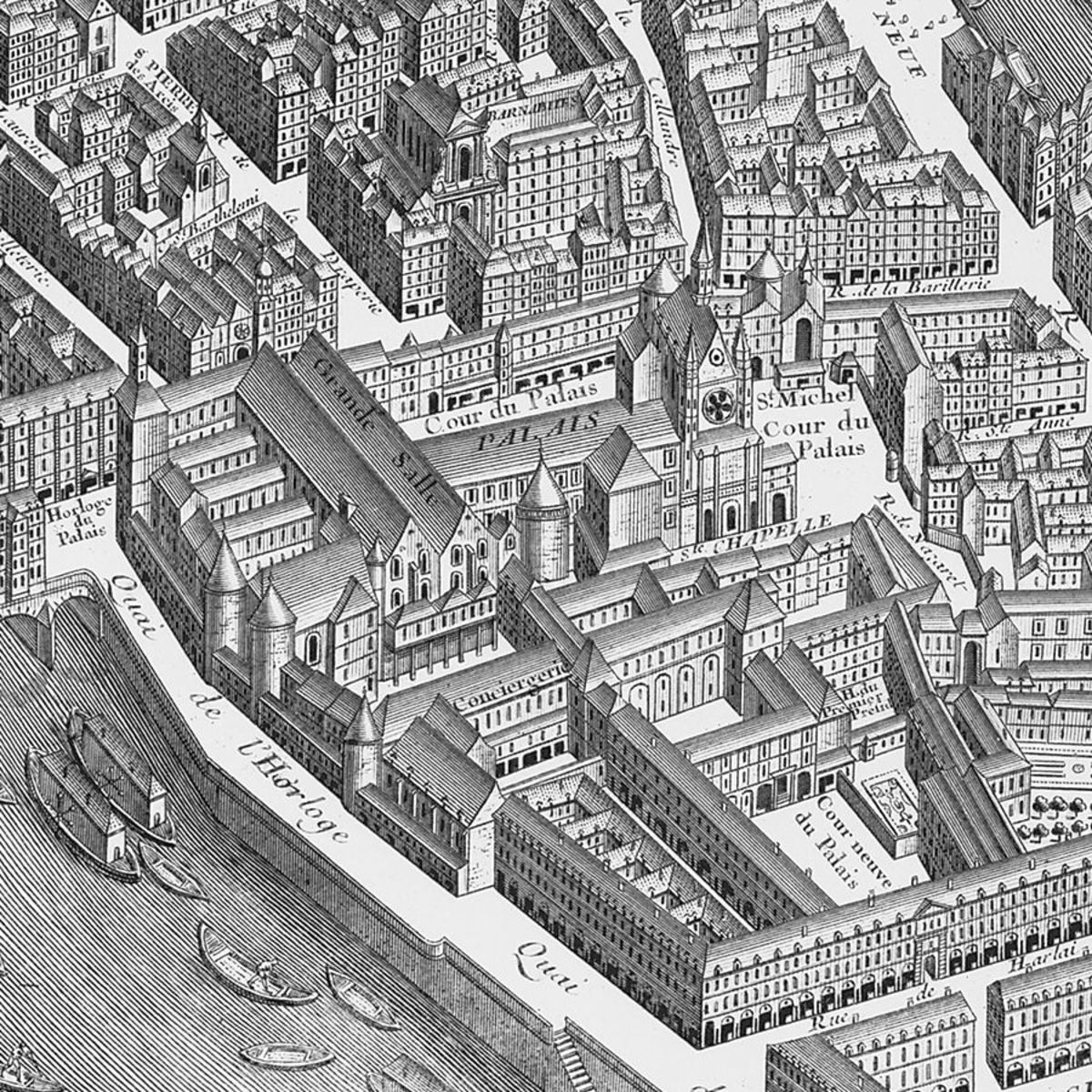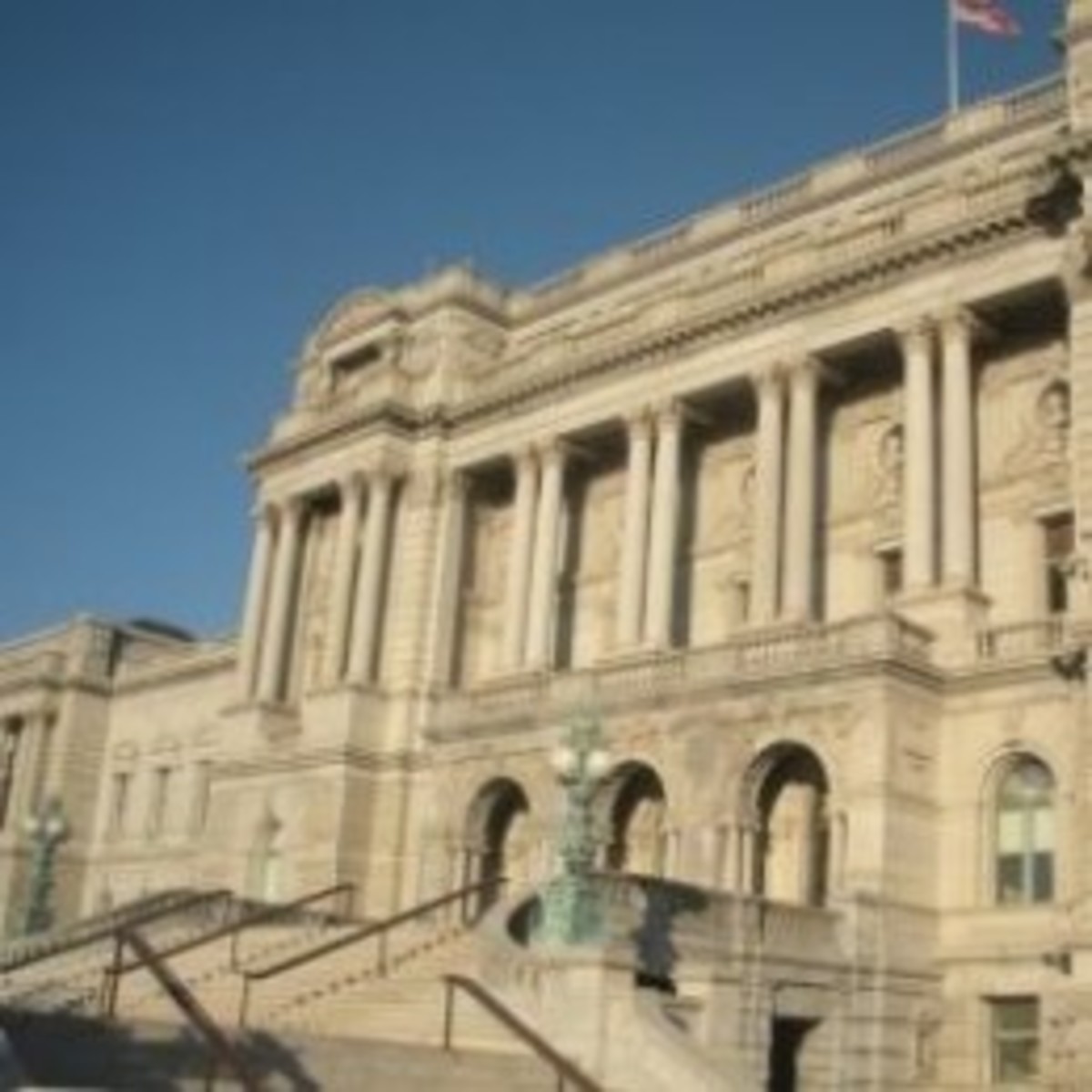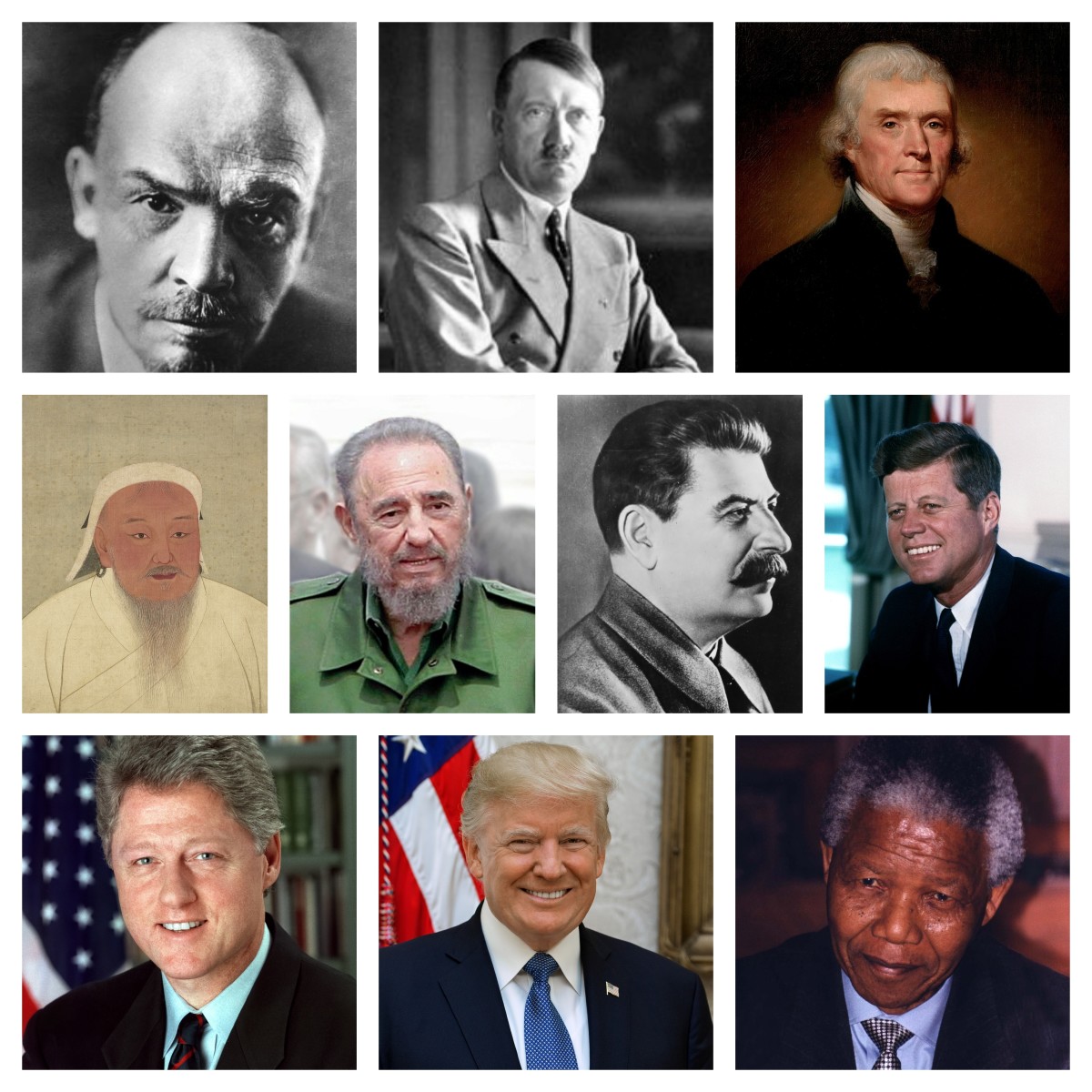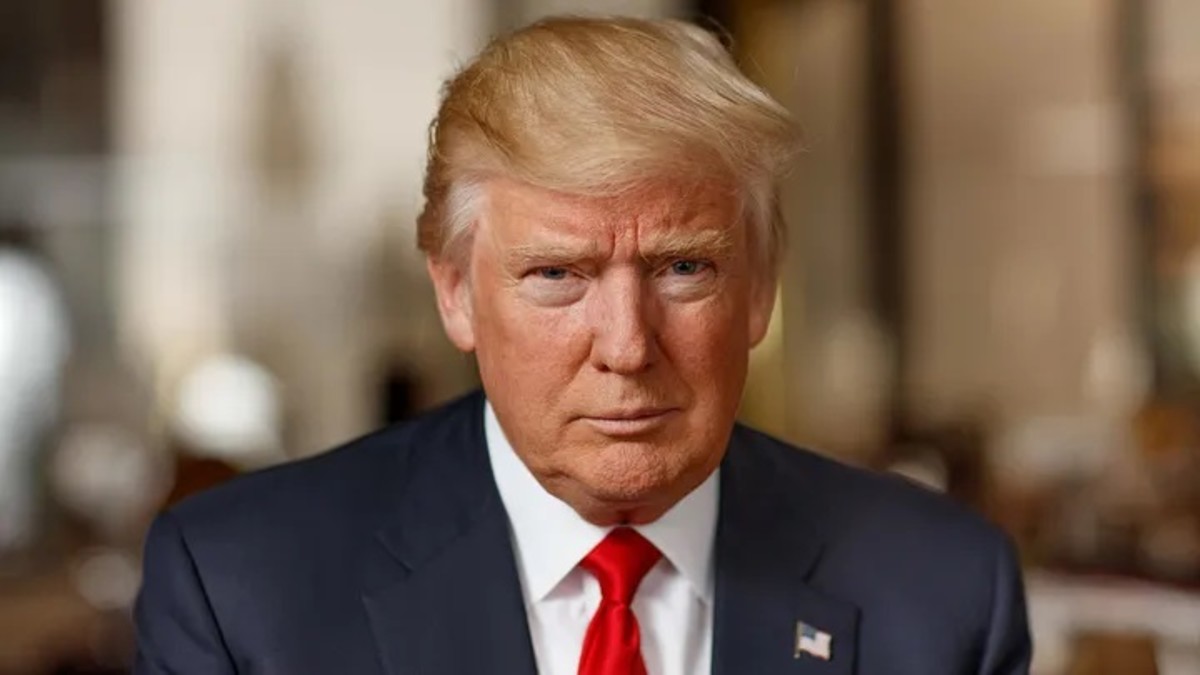American History II - Thomas Jefferson, an Amazingly Complex Founding Father! [174]
GLOSSARY
ME THINKS, I LOVE THAT OLD ENGLISH TERM, that it would be helpful to identify a few political terms since I will be translating meanings over three centuries and time seems to have a way transmorphicizing words (if I finished "into whole new meanings", I would be redundant, btw, I just looked that word up). So. if I talk about "liberalism" and "conservatism", what am I really talking about? One doesn't really know until I put it into the context of the year from which I am drawing the term, for holding "conservative" principles in 1770 is not the same as holding "conservative" principles in 2012.
So, let's start with "conservatism". Many think Jefferson was a conservative, especially conservatives, but he wasn't, not by any stretch. It is not easy to define what conservatism is, as I found out trying synopcise it for this hub. So, I wrote two more hubs to describe it. The first one, discussing the origins of "modern" conservatism from 1770 can be found at http://myesoteric.hubpages.com/hub/A-Brief-History-of-Conservatism-1700-to-2012.
THOMAS JEFFERSON, POTUS# 3
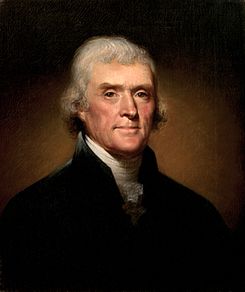
HOW DID AMERICA REALLY BEGIN?
I PERSONALLY THINK IT IS SAFE TO SAY, America, as we know it today really shouldn't exist. But, because of the arrogance of some Men, and the vision of other men and women, it happily does. In fact, virtually every founding father we like to bring forward to support one political debate or another tried very hard, up until 1776, to stay a part of England, as did most colonists; they were all relatively happy being the King's subjects.
What the colonists became very perturbed about, however, was being subjects of Parliament. Until recently, it was my view that the issue that needed settling was an appropriate accommodation with Parliament, one that the English legislative body was not willing to make and where the King, King George the III, backed them up. This is where I keep kicking myself for not getting interested in American History at 16 rather than 63.
While my previous view was functionally correct, the outcome was the same, the history was not, and know the correct history explains a lot; many things sort of "clicked" into place, as it were. What the colonists actually wanted, and Thomas Jefferson, along with many others, wrote to Parliament and the King about, was NOT and accommodation with Parliament at all. Instead, they denied Parliaments right to legislate over the colonies at all! In my ignorance, I didn't ever realize that distinction, and it is a big one. What the colonists had proposed to King George was the establishment of the first Commonwealth of Great Britain, some 140 years before it actually became a reality. In this arrangement, England would have its Parliament, and each colony would have their legislature, each on equal footing with Parliament, with all being subjects of the Royal Crown, King George III, in this case. That way each colony would be represented in a Republican fashion in the same way the People's of England proper were by Parliament.
America had produced a plethora of wonderfully articulate and persuasive writers, Thomas Jefferson among them; and each had their hand at trying to convince King George this was the rational course to take. As we all know, King George didn't listen to their sage advice. That was Phase I.
Phase II began with the realization that the colonists were going to be ignored and the more they protested both peacefully and violently, the more draconian King George and the Parliament became through the period of 1774 - 1775. Now, keep in mind, there were those on the colonial side whose agenda was a separation from the Mother country from the beginning, and they were very much the provocateurs, rabble rousers, and trouble-makers. But, in the main, the principal politicians tried to reach and agreement that included a clear understanding of the separation between colonial governance and Parliament; sort of like the conservatives stance on no tax increase for the rich today; the issue is so meaningful to them, they will risk a revolution over it.
Unfortunately, King George had bills to pay and the Islanders weren't about to pay any more in taxes. Further, he wasn't about to be pushed around by these upstart, persnickety, ungrateful colonialists; he sent in the troops. Up until that point, there was no "confederation" of colonies, no "Union" of states; just 13 independent colonies that often bickered amongst each other and taxed each other for various reasons. But, as any student of history and military knows, when a related but nevertheless heterogeneous group is threatened by a common enemy, they coalesce; and that is what the colonies did. Not out of the goodness of their heart and brotherly love mind you, but from political manipulation playing upon shared interest.
For example, George Washington was chosen as leader of the Continental Army not because he was a great military tactician or strategist, he wasn't either, it was because he was a Virginian of stature, literally and figuratively, who the North felt was needed to bring along the rest of the Southern states into supporting New England; Washington really, really did not want the job. Likewise, this was part of the reason Thomas Jefferson was chosen to write the first draft of the Declaration of Independence, to get Southern buy-in. It also helped he was a much better writer than John Adams, which is another reason Adams pushed Jefferson so hard to do the work.
Well, again, the rest is history and Phase II is over with America, France, the Netherlands, and some help from a few other friends beating the British; the colonies were independent and a free ... what? We weren't really sure, we just knew Parliament wasn't the boss anymore. So began Phase III.
This was the first attempt at self-government of a, he he, "unified" nation; not. We were back to 13 bickering colonies who had been renamed States. Via the Articles of Confederation, there was a more formalized Continental Congress with virtually no power, no executive and no judiciary; the States started going their own way and the "Nation" began to fall apart.
Sane minds saw the writing on the wall that was leading to the probable dismemberment of the colonies to various spheres of European influence, and under the pretext of "strengthening" the Articles of Confederation, formed the Constitutional Convention, or Phase IV. This set of founding fathers saw the need for a much, much stronger central or federal government in order to secure a true Union of the States that could act as one Nation toward the rest of the world, and not 13 quarreling entities all pulling in different directions, ripe for the picking. From this meeting came today's U.S. Constitution sans the Bill of Rights.
Phase V, of course, was getting the darn thing ratified, which I discuss in another hub; but suffice it to say, it barely happened because of the opposition to a strong central government, a fight still going on in 2012.
HISTORY REPEATING ITSELF
I WAS GOING TO START THIS HUB OUT DIFFERENTLY, but because the 2012 election is only a few days away, I thought I might rearrange things a bit. It is not because who is going to win the Presidency is so important, in this day and age, it really is of only passing interest; it is who is going to be elected to each House seat in the House of Representatives and the 1/3 of the Senate that is being re-elected. Why is this more important than the Presidency? Because Congress has become so polarized on side of the aisle as to make that branch inoperable and, as a consequence, bring the whole government to a stand-still because one side lost their way as to what it really takes to govern; that to govern mean to compromise; to let pragmatism win out over principle in the end.
What led me to my change in plans is having just finished, well not really, I am still reading this chapter, but am far enough along to begin relating it to you, absorbing what Thomas Jefferson biographer Alf J. Mapp Jr. has to report regarding Governor Jefferson's trials and tribulations in "leading" Virginia through the American Revolution; it was not pretty, in fact it was very ugly and it bears directly on choices people have to make at the voting booth on Nov 6th regarding who they will choose for their Senator and U.S. Representative.
This is just one small vignette out of many and revolves around the inability of our early government to respond to emergencies because of Constitutional handcuffs. The background comes to us in two pieces. First, in 1776, along with the Declaration of Independence, Thomas Jefferson, George Mason, and James Madison drafted the first Constitution of Virginia1; it was a very Principled document, but not very Pragmatic. Because of their experience with England and the King, while they provided for an Executive function, a governor, its powers were severely limited; virtually all power was vested in a part-time legislature, the House of Delegates and a Senate; Republicanism at its best. Further, power was concentrated in the hands of land owners and the aristocracy, the only people thought to have "natural rights".
The Executive was furthered hampered by having to seek the advice of a "Council of State" ,which were also appointed by the legislature, for virtually all official actions, which wasn't very much. They were 1) within certain limits, grant reprieves and pardons, 2) within certain restrictions, call the legislature back into session, 3) with certain restrictions, appoint officers to the malitia and punish them, 4) with certain restrictions, embody the militia and direct them, and 5) with certain restrictions, appoint judges of various types and other governmental officials. By "certain restrictions" that generally means "with advice and consent" of the Council of State although in some cases it might mean with approval of the legislature. When Thomas Jefferson wrote these rules, he was following his Principles and did not realize the Pragmatic consequences until a few years later when he was Virginia's second Governor fighting for Virginia's life in the Revolutionary War.
The second piece of background knowledge is that in 1780 Virginia was on the verge of being invaded by the British from South, from North Carolina and the East through the river system leading inland to the West. In the midst of this, and indicative of the suspicion which the independent minded Virginians held of the newly-formed Central government in Philadelphia, believed a rumor spread that Spain and France would join on the Revolution's side "only if" the new America would cede its claims to Florida and control of the Mississippi to them, a proposal Congress supposedly refused to accept. These were terms the short-term thinking South thought reasonable. Even Jefferson figured "It would surely be better to carry on a ten years war some time hence than to continue the present an unnecessary moment."3. Jefferson was even prepared to renew the old "Committees of Correspondence" between the States, so important to throwing of the shackles of King George, so that the American states could by-pass the Continental Congress and negotiate directly with France and Spain. (This is a disconcerting characteristic Jefferson will display again with his fight with the Supreme Court when he was President.) As is true with most rumors, as we see today in are current political debate, there is only a kernel truth surrounded by a mountain of deception by the side doing the decieving and the rumor was totally false. Fortunately, despite his suspicions, Jefferson waited for his delgates to return from Philadelphia in order to ascertain the truth, before proceeding; something we do not seem capable of doing in 2012's public discourse.
GENERAL BENEDICT ARNOLD: HERO AND TRAITOR

GENERAL BENEDICT ARNOLD TEACHES US A LESSON
NOW WE CAN APPROACH our vignette. With the Revolution in disarray, the southern States essentially ignoring the needs of the whole to attend to their perceived individual needs, with Virginia being the least guilty, and England having turned its attention in that direction, the Virginia Assembly, in May 1780, granted Jefferson AND his Council emergency powers to manage the war; not that it did much good. Jefferson, at his own design in 1776, could not act on his own, and Jefferson and the Council could not act without a quorum of the Council being present; and that was the rub. For example, from Apr 7 to May 13, 1780, no executive business was accomplished because a quorum could not be established. The ridiculousness of this "governing by committee", which even today there are adherents for, will be apparent in a couple of closing examples as well. Suffice it to say that in a moment of despair, Jefferson wrote Richard Henry Lee these words, "The application requisite to the duties of the office I hold [governor] is so excessive, and the execution of the them after all so imperfect, that I have determined to retire from it at the close of the present campaign ..." Fortunately, Jefferson didn't.
On Oct 20, 1780, a British force of 5,000 arrived near Newport News, VA and began a campaign in the Hampton Road, Portsmouth area. Fortunately, by Nov 15, duties called them elsewhere and the reembarked and sailed away. As a result, however, since the Virginia militia was so ill-equipped to respond to such an invasion, Jefferson called for a standing army, and extremely radical measure in those days. Apparently the situation was not dire enough and the Council of State overrode him; the Assembly would not be back in session until March 1781.
However, on Dec 31, 1780, the British returned to the James River, and a force, led by the hero-turned-traitor General Benedict Arnold travelled past Jamestown, past a point along the James River called the Hoods, and ultimately disembarked 900 troops South of Richmond at Westover on Jan 5, 1781; General Arnold proceeded to sack Richmond after Governor Jefferson, the Council of State, and the rest of the Virginia government scurried out to the West.
While this was going on, Thomas Jefferson was not unbusy ... after initially delaying any action from Jan 1 to Jan 3, for fear of crying Chicken Little, a position the Council entirely sympathized with. Jan 1, 1781 was a Sunday, so Jefferson, after learning of the arrival of the British the night before, did not convene the Council, deciding to wait for more information and the normally scheduled meeting the next day. He did, however, set out a series of relay riders for the transmittal of information. On Monday, Jan 2, he convened the Council, reported these measures and then adjourned. On Tuesday, Jan 3, Jefferson received word Arnold was on the move up the James River, and he ordered the militia of six counties to the defense of Petersburg, where he thought the enemy was headed. On the morning of the 4th, word came the fleet was actually moving on Richmond!
Jefferson organized the evacuation of Richmond along with as much of the arms, munitions and other war material as he could. By 1 PM, Jan 5, General Arnold arrived, unopposed in the center of Richmond, finding it empty. The Governor kept moving, getting Generals Steuben and Nelson from the Continental Army were moving North from Petersburg, and the Virginia militia was finally organizing itself and moving on Richmond as well. Seeing this, Arnold ransacked Richmond and ultimately retreated back to Yorktown to await British reinforcements.
Virginia had been decimated, the government scattered, the Virginia Constitution hamstringing any meaningful action even if a quorum could be established, militias and the Continental Army acting as independent agents, and Governor Thomas Jefferson all the while riding around on horseback West of Richmond trying to organize what resistance he could muster within the authority he was allowed. Oh yes, he took the time to be unseated by his horse and break his arm while all of this was going on!
PRINCIPLES AND PRAGMATISM MEET HEAD-TO-HEAD LIKE A PAIR OF RAMS
Now to the meat of this hub after a very long preamble. (and you thought I was about done, am I ever done in my hubs?) As with many novels, most words are not wasted, and in this case, I tossed in what was probably passed right by as totally meaningless; it would have been by me anyway. It was the reference to a point along the James River called "Hoods" which General Arnold passed on his way to Richmond. This is actually central to this story because it was at Hoods. a place I can't even find on today's maps, where, in November 1780, Jefferson recognized a fortification could be built to protect the James River from encroachment by an enemy fleet. He wasn't the only one to recognize this fact either, General Steuben of the Continental Army was also aware of this feature and IF such a fortification had been built, all of what I just described probably would not have occurred!
In November 1780, Governor Jefferson wrote Speaker Benjamin Harrison of the Virginia Assembly of the need to construct a battery at Hoods, which must be somewhere between Jamestown and Richmond, but a sufficient distance from Richmond to preclude an easy march by any invading force. Given that Virginia had already lost the mouth of the James and Potomac rivers, Jefferson had already withdrawn the batteries from Portsmouth, Hampton, and York; there had even been a little progress made at constructing a fortification at Hood. Accompanying the letter to Harrison was a report Governor Jefferson had requested (he didn't need the Councils acquiesence for this) from one Colonel J.C. Senf, an engineer, as to what would be needed to prepare the site. As with any good legislature in the time of crisis, the matter was discussed in the House of Delegates, referred to committee on December 2 ... and tabled!
Enter General Benedict Arnold, stage South on December 31, 1780 and leaving seven days later by the same route.
Governor Jefferson returned to Richmond on January 9 to survey the damage. He convened the Council to begin governing again and all of three Council members showed up, not enough for a quorum. Each day he reconvened the Council and it wasn't until January 19th when a fourth member showed up whereby they could conduct business; the essence of a Republican form of government, mind you.
Even with a quorum, nothing of substance regarding the prosecution of the war was accomplished by the Council and Governor. In early February, Jefferson received a letter from General Gates warning him that if the British cannot be held at bay in the southern and eastern parts of North Carolina, "you must expect tge weight of the war will penetrate to the bowels, [of Virginia]" Gates goes on to say
"Have you cried aloud to Congress, and to the Commander and Chief of The Army, for succor? Have they listened to your cry? (yes they really talked like that then) If they have not, are you [Virginia] doing the best thing for yourselves? Military wisdom gas ever heretofore been imouted to Virginia. Is there a rottenness in the State of Denmark? Find it out, and cut it off."
Of course, General Gates knew Jefferson had not been silent towards Philadelphia or Washington but nevertheless had to play the game by goosing Jefferson along. Jefferson, for his part, did what he could within the restrictions of his republican government. The Council no longer seemed to seek the initiative and was quite willing to let Jefferson assume the responsibilities "so long as he did not interfere too drastically with the normal lives of private citizens!"
General Steuben renewed his frantic request to complete the fortification at Hoods. He believed he needed 40 slaves and 10 mechanics to complete the work in time to prevent Arnold and the British from returning up the James river. Jefferson agreed to supply the required force by February 7, 1781. As required by the Constitution, Jefferson went to the Council for their "advice", meaning approval; they demurred, believing "they had no right to call out the militia to do fatigue duty". In his letter to General Steuben, Jefferson got to the heart of the matter with a "leaderless" form of government. He said,
"The Executive have not by the laws of this State any power to call a freeman to labor, even for the public, without his consent, nor a slave without that of his master."
Jefferson then went on to tell Steuben that he, Jefferson, had personally authorized Colonel Senf to find an artillery officer to erect the battery and to procure the laborers, slaves, and materials necessary to build the fortification.
Then, on February 15, General Steuben met personally with the Council to urge their cooperation in impressing all Virginia vessels on the James to join with the French fleet when it arrives in order to coordinate their attacks on the British fleet. He and Jefferson ended the meeting with the distinct impression the Council of State was very much in favor of this. Wrong!
Not only did the Council not see the need the need because of "their fear that individual freedom would be circumscribed, but also balked at the proposed expenditures as not being absolutely essential." It boggles the 2012 mind.
I leave my vignette here as it sufficiently explains my point. Here we have a loose confederation of "states" fighting for a common cause, to free themselves from the tyranny of a dictatorial Parliament and, at best, an uncaring King who have instituted governments based purely on Principles they believe ought to govern the relationship between governments and the People; they are in the middle of this battle yet they pretend they are not. They pretend it is someone else's problem to solve and they best not trample on my Principles while They do it. In Virginia, through worst part of the fighting, the Assembly didn't even bother to come back into emergency session prior to March 1871, when they were normally scheduled to convene, what is that? Richmond is invaded yet the Council thinks it is too expensive to fight the British nor not a good idea to call out the navel militia to fight them because it might impugn on their individual freedom, a freedom they might not enjoy if the British win.
I write this hub because the thought process in play in 1780 and 1781 is not that far removed from what is happening in Congress in 2011 and 2012 with this "no compromise" Congress a segment of America has voted into office. I am having a very hard time distinguishing between the mindset of the those that make up the Conservative block of the Republican Party today and those of the Council of State of Virginia in 1781. Can you?
WHAT IS THOMAS JEFFERSON'S TRUE POSITION ON RELIGION?
MANY WORDS HAVE BEEN WRITTEN REGARDING what Thomas Jefferson's religious beliefs were and what he believed the relationship of the State and an individual's religious beliefs ought to be. It is now very clear to me that Thomas Jefferson was a "religeous" man, but not a "Christian" man in the way Christianity was thought of then nor is thought of today. That he believed in a God, Almighty, there is no doubt. But there is also no doubt that he believed God acted in the way the eccesiatical rulers of the day required you to believe God acted. To put it more simply than Jefferson really believed; God created all that is and then sat back to see what he had wrought; Jefferson was a Diest, common among those who followed the Enlightened path popular of the day.
What I don't know, as of yet, is if Jefferson believed as I do that God and Nature are one in the same or as Christians do that God and Nature are distinct entities. Either way, Jefferson was considered a heritic by many and only his strength of character, station in life, intelligence, the Enlightenment movement, among many attributes, all combined save Jefferson from a fate of banishment or worse for believing in God the wrong way. Thomas Jefferson summarized many of his views on this subject in his Notes on Virginia and the resolution regarding the separation of Church and State which he prepared for the Virginia House of Delegates which James Madison ultimately won passage.
WHAT IS OLD IS NEW
IN ANOTHER HUB, THE FOLLOWING would be paraphrased, after which I would ask "who wrote this?". But, since this is a hub about Thomas Jefferson, that sort of gives away the punchline. Nevertheless, I believe it would be useful and instructive to present this quote anyway regarding the two-party system and "getting along". In a letter to Edward Rutledge when Jefferson was Vice President, he lamented:
"You and I have formerly seen warm debates and high political passions. But gentlemen of different politics would then speak to each other, and separate the business of the Senate from that of society. It is not so now. Men who have been intimate all of their lives cross the streets to avoid meeting, and turn their heads another way lest they should be obliged to touch their hats. This may do for young men with whom passion is enjoyment. But it is afflicting to peaceble minds. Tranquility is the old man's milk."

